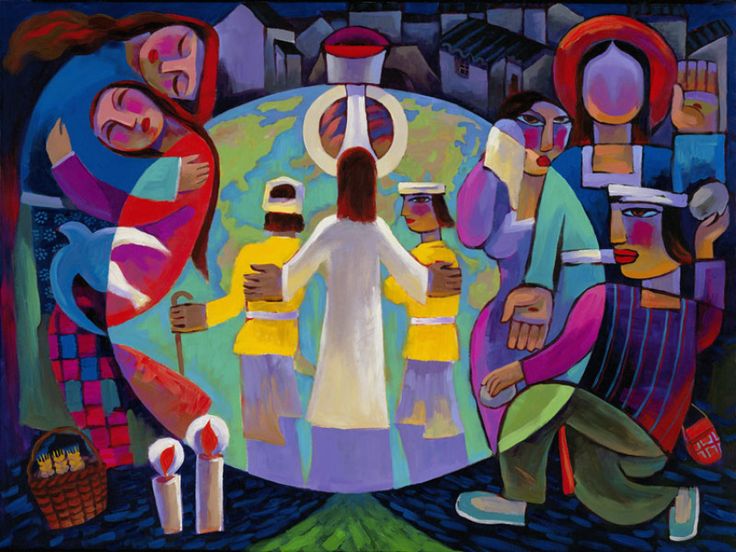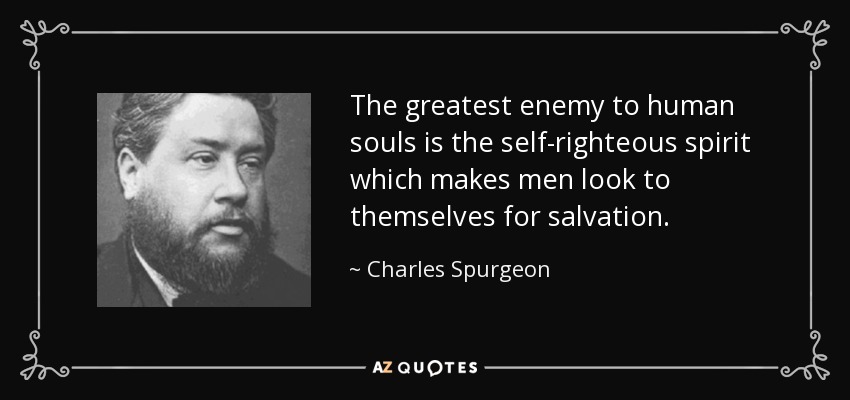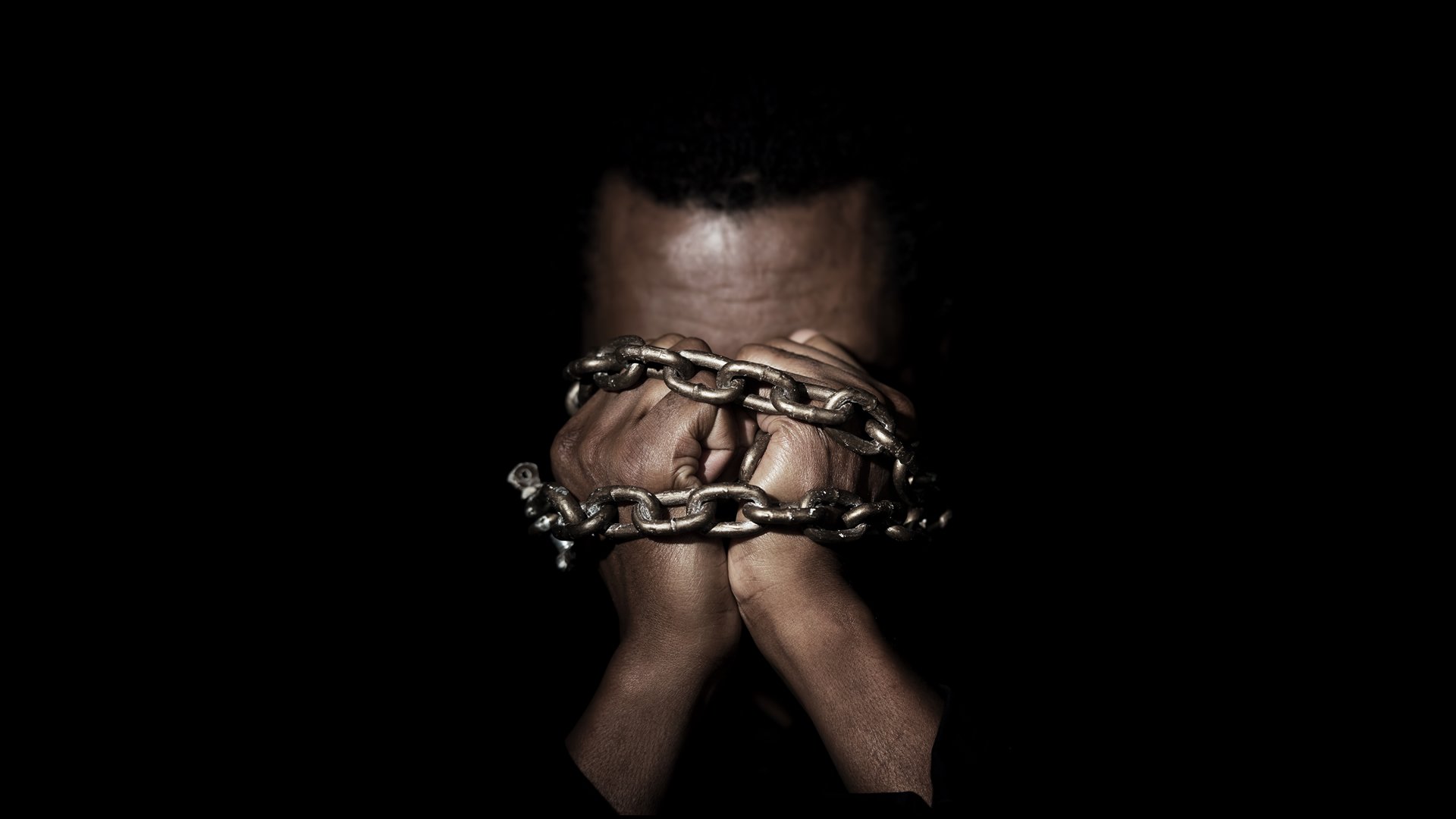Lenten Devotional – FRIDAY, Mar 26: ON MY ACCOUNT
Here is another phrase that means for righteousness’ sake. Christ blesses, specifically, those who experience insults, libel, slander, being reviled and/or persecuted, because they love and follow in his Way.
He addresses those who now identify as his followers and disciples. Yet he also addresses seekers who are curious and engaging with his Way.
Who, in our times, is persecuted for their faith? Often whole groups of people are persecuted for a ‘monolithic’ identity that has been assigned to all of them.
Since 9/11, fear and bias of Muslims has grown in the US. More people now hold negative views of Muslims, conflating the religion with terrorism or extremism, and projecting those biases and concerns onto anyone might be a practitioner of Islam.
Imagine assuming that to be Jewish is ‘one thing.’ Judaism has a wide variety of expressions, as do many religions. And some people experience it as a cultural identity rather than a religious one.
Imagine lumping all Israeli Jews and Palestinians under those two labels, as if those categories represent the whole reality of a person’s identity. As if those two terms can embody the multitude and complexity of thoughts, feelings, views, and experiences held by the individuals who might align with those affiliations.
Consider that within Islam, different groups have longstanding enmity. Shiites and Sunnis, for instance, have historic conflicts in some regions. Yet to assign a person a whole identity, based on one aspect of his or her religious affinity, underestimates the complexity of historical and current religious, ethnic, cultural, and social realities.
Consider mistakenly believing that to be Christian is ‘one thing.’ Some people don’t even understand that all Christian movements grew out of Catholic and Orthodox traditions. Think of the Protestant and Catholic wars that have raged in the past and now in places like Ireland.
Even in current times, belonging to the wrong religion, in some nations, can be a death sentence. Genocides have been committed against Muslims, Hindus, Christians, Jews, Buddhists and others.
People are often persecuted for growing up inside a religion, even if many of the underlying causes of the conflicts aren’t ideological, but social and political and economic. Individuals are sometimes held accountable for the wrongs and hurts inflicted by religious institutions, even if the individuals who practice that faith didn’t commit those wrongs. They have been assigned, in such cases, a role as spokesperson for an entire faith. Yet can any individual speak on behalf of a whole faith?
These are a few ways that people might, in our times, be persecuted for faith. Let us recognize that the condition of being persecuted for one’s faith isn’t limited to a Christian experience. At this point, Christians are less likely to be persecuted than most other religions, since many countries identify, at least culturally, as Christian-majority nations. Yet it happens.
Again, this Beatitude names a broad human experience. In the most ideal understanding of this Beatitude, all people who are judged and harmed for standing up for or being connected to a faith are encompassed by this blessing. ‘On my account’ becomes the language that holds open the door for all people to be welcome into God’s Kingdom, since it represents Christ’s inclusive, expansive form of agape love. — Rev Gail
MEDITATIONS
I’ll tell you one thing for sure: once you get to the point where you’re actually doing things for truth’s sake, then nobody can ever touch you again because you’re harmonizing with a greater power. — George Harrison
He that does good for good’s sake seeks neither paradise nor reward, but he is sure of both in the end. — William Penn
For God’s sake hold your tongue, and let me love. — John Donne
To love for the sake of being loved is human, but to love for the sake of loving is angelic. — Alphonse de Lamartine
The arts are not a way to make a living. They are a very human way of making life more bearable. Practicing an art, no matter how well or badly, is a way to make your soul grow, for heaven’s sake. — Kurt Vonnegut
It is only for the sake of those without hope that hope is given to us. — Walter Benjamin
Question or Challenge: Who embodies God for you? On whose account would you be moved to get involved in an ethical cause or activity? Would it sometimes be someone who is authoritative, influential, persuasive, or powerful and invites you to participate? Or might it be someone who needs your help and support and motivates you to take action? This isn’t a right/wrong, either/or scenario. Just a prompt to learn where we might experience the presence of Christ in our lives, inviting us into ethical engagement.
Lenten Devotional – TUE, Mar 23: RIGHTEOUSNESS
We tackled the word difficult word ‘righteous’ earlier in this series of reflections. As a brief reminder, righteousness means, in simple terms, to act and live in right relationship. Let us clarify righteousness as seeking a ‘right relationship’ with Godself in the context of this Beatitude’s blessing.
Well, if a person is living, behaving, choosing, and speaking in ways that honor ethics and core values – righteously — why would they be persecuted? The late Civil Rights activist and Congressional representative John Lewis famously urged people to make ‘good trouble, necessary trouble.’
Given that framework, we can imagine that standing up for your beliefs, getting involved with a cause that motivates you to make others uncomfortable, provokes a reaction. You may simply be acting on your principles, not attempting to convert others to your way of thinking, but the choice to engage in any form of activism or advocacy can put you in the position of being a target. Any act to make a difference, to live and act righteously, and not complacently, may draw someone else’s criticism or judgment.
Yet another saying is ‘silence is violence’. Thus, if the choice is to do nothing and allow harm to continue, or do something and help create healing change, we are called to act.
Simply caring enough to choose or act — for righteousness sake — means you’re going to make some ‘good trouble, necessary trouble.’ And someone else will object!
Back to persecution: you didn’t start the persecution. Nor did you invite it. Yet it’s happening. Or has already happened. Or will happen.
Maybe your level of involvement in change-making is restricted to personal acts such as financially supporting organizations, voting your conscience, or writing to government representatives on issues that draw your concern. Maybe you stay private and keep to the background.
Or maybe you’re public in your support for others. Righteousness, after all, is usually expressing care for the wellbeing of others. You share your choices and views. Volunteer for an agency or organization that responds to problems about which you are passionate. Post on social media. Document. Bear witness. Report. Reach out. Get involved. Put yourself on the line.
Either way, in this small-town world in which we live —and this technologically-connected environment in which we function—often our views and choices become known to others. Along the way, somehow, we become targets for persecution, because we care.
We explored, yesterday, that ‘persecution’ might include a range of experiences. It could involve anything from being socially bullied and criticized to being arrested and imprisoned. Depends on where you live and who took exception.
Regardless of whether persecution was intended to reach you, or you were a bystander swept into the event or experience, the result is hurtful and harmful. It’s a tough experience. Persecution leaves a mark, either inside — emotionally and psychologically—or on your wellbeing physically and socially. Victim-blaming can also reverse the attention, so that people hold you responsible for what happens to you, instead of looking at the perpetrators.
What is our consolation and comfort in response to persecution? Even for righteous reasons? The Beatitudes have already extolled the resilience of people who have felt powerless, hurt, sad, marginalized, invisible, isolated, imprisoned, starved, excluded. The Beatitudes describe the tenacious nature of human beings. And envision that the world in which we live, and the people we meet, will offer the resources we need to cope.
We are not alone. God shows up, not just as an invisible conversation partner on the other end of a prayer to heaven, but as the muscular and tangible love and justice and compassion we receive in our lifetimes.
Being the victim or target of persecution, even due to faith, isn’t okay. God doesn’t desire for us to suffer or to be tested, as if we’re in some sort of trial, passing an exam, or in the process of being refined and perfected through loss and trauma.
Bluntly, you don’t have to be persecuted to be righteous. The Beatitudes aren’t an instruction manual on how to become righteous. It’s the opposite. It’s recognition that being righteous can be dangerous. And yet we’re already choosing to be those people who care—and act out of care—for ethical and spiritual reasons. For righteousness sake.
Along those lines, please know that God doesn’t make persecution—and other damaging things—happen. Rather God shows up in the response to such experiences. God’s intentions for us are creative, good, loving, healing, holistic, and merciful.
Persecution is definitely a human-made condition. A social challenge.
Godself knows that the world isn’t perfect. After all, people aren’t perfect. People are part of God’s creation, and creation is already a living system full of messy beings. Also, as humans live in society together, people create systems and institutions that embody and perpetuate social wrongs and subtle forms of persecution. And Godself cannot protect and shield us from living in this world. God doesn’t promise—on earth—an end to suffering. We’re not exempted from the full experience of being mortal.
In fact, sometimes those who are persecuted are also embodying God’s response to others. We’re showing up for someone else, and in the course of doing so, we’re becoming the ones who need someone else’s help, too.
Yet in our faith, we believe God walked among us, incarnate as Jesus, to know us better. Godself abides with us, even now, as Spirit. God knows firsthand what it feels like to be a vulnerable human being. To do the right thing. To stand for what you believe in. To speak and act for the wellbeing of others. And to be questioned, invalidated, challenged, judged, ostracized or tormented for it. Even killed over it.
God didn’t start the persecution. Yet God is accompanying you on this righteous—right relationship— journey you’re taking. Into fires. Through trials. Beyond judgment. On the streets. In the hospital waiting room. On the Facebook page. In prison. Along the trail. At home. Among the Twitter feeds. In the classroom. Behind the wheel. At the shop. On the mountain. Past death itself to where love lives.
What is the ultimate force behind what we do for righteousness’ sake? Love. Holy love. Love’s alive, here, among us. — Rev Gail
MEDITATIONS:
If a man perfectly righteous should come upon earth, he would find so much opposition that he would be imprisoned, reviled, scourged, and in fine crucified by such, who, though they were extremely wicked, would yet pass for righteous men. — Plato
The humblest citizen in all the land, when clad in the armour of a righteous cause, is stronger than all the hosts of error. — John Dos Passos
Righteousness is the truth revealed and working in you. — Sherry White
Desire of righteousness is preceded by repentance, accompanied by humility, and followed by works of mercy. — Gaultier
Challenge or Question: Have you ever needed to respond to a situation wherein someone else was being persecuted? How did you respond?
Lenten Devotional – MON, Mar 22: Persecuted
Commentators connect this week’s blessings with the earlier Beatitude passage about peacemakers. All the blessings are integrated. One scholar writes, ‘Here again there is a profound significance in the order. The work of the peacemakers is not a light and easy work.’ When believing in, and working for, a righteous or just cause, a person may suffer ridicule or harm.
What does persecution mean? Why would we ever put ourselves in a position to experience it?
Perhaps the threat or damage is verbal or physical, psychological or emotional, personal or social. It can come in the form of insults and lies, gossip and judgment. It may mean torture or bullying.
The reason for which one experiences the persecution is integral to the blessing. The reason — the cause that speaks to our values — is the only reason we’d risk anything that could be called persecution.
The people who are persecuted have found something for which they’re willing to take risks. They are folk choose uncommon, even revolutionary paths, in the sense of going against public opinion. They’re committed.
They’re the family, friends, neighbors and strangers we’ve met in earlier Beatitudes. The pure-hearted, who are single-minded and whole-hearted. The meek, who are kind but strong when they choose to hold their ground.
This state of being includes those who are passionate about their faith, and what it calls them to do for other people we also see in the Beatitudes: the hungry, the poor, the sorrowing, the powerless, the marginalized, the vulnerable, the hurt, the broken. Do you recognize yourself in this description, as one who will stand up for others, because of your faith-based values? — Rev Gail
MEDITATIONS:
Our wretched species is so made that those who walk on the well-trodden path always throw stones at those who are showing a new road. ― Voltaire
They can take our homes, our possessions. Our families. Our lives. They can drive us out, like they’ve driven us out before. They can humiliate us and dehumanize us. But they cannot take our thoughts. They cannot take our talents. They cannot take our knowledge, or our memories, or our minds. ― Amy Harmon
Challenge or Question: What causes require that you put yourself at risk, either exposed to public opinion or in some other form? Have you ever felt persecuted? Or perhaps, upon reflection, have you ever participated in the persecution of another person?


